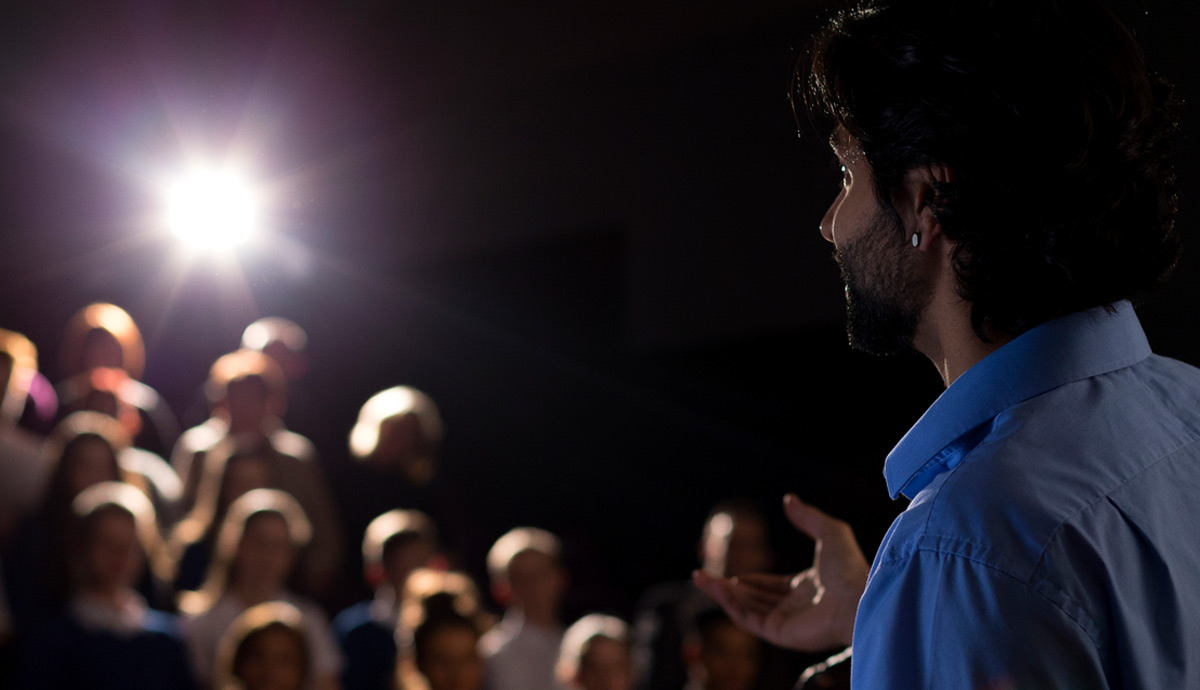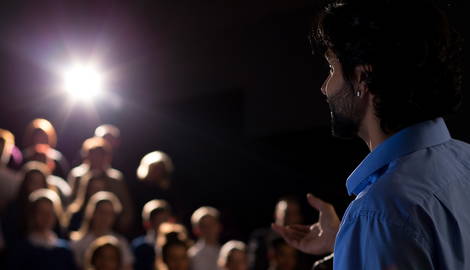
Have you ever walked into a room full of people and felt like you’ve just walked upstage? The spotlight effect can feel as if you’re delivering a solo performance. While you may not be paying attention to your audience, you’re almost certain they’re watching you, ready to cheer your accomplishments and judge your slightest mistakes. The spotlight effect is a widely common psychological phenomenon characterized by self-consciousness, anxiety, and unease. By uncovering some of its causes, we can find our way back to feeling comfortable under our skin.
What Is the Spotlight Effect?

The spotlight effect is our tendency to overestimate how much others notice us. Coined by Gilovich et al. in 1999, the term is a metaphor alluding to how people feel “the social spotlight shines more brightly on them than it really does” (Gilovich et al., 2000). Whether we think the light is exposing our positive or negative traits, being under the spotlight is often nerve-wracking because it perpetuates a sense that our actions and appearance are scrutinized.
We may feel, for instance, that everyone can notice that we’re having a bad hair day, or that nobody in the conversation got over that awkward thing we said half an hour earlier. Inversely, we may feel that everyone can notice our cool new sunglasses or that clever remark we made during a presentation. It’s so hard for us to realize that nobody really cares. And much harder to believe that others are probably under their own spotlights too!
Why Are You Under the Spotlight?

You may feel under the spotlight for various reasons, but the underlying cause is typically the same. The spotlight effect is the byproduct of our ego-centric bias – our tendency to heavily rely on our own perception and experience when assessing the world around us. We are often immersed in the rich landscapes of our inner lives, carried away by thoughts, emotions, desires, and all the things that make up our experience and representation of self.
We are naturally more focused on what is happening to us rather than what is happening around us, which makes our inner experience act as a primary lens, or point of reference, through which we see and understand the world. The spotlight effect occurs when we forget that other people are as caught up in their inner lives as we are, feeling at the center of their own private universe. As Gilovich et al. explained, the spotlight effect happens when people “anchor on their own rich phenomenological experience and then adjust – insufficiently – to take into account the perspective of others” (Gilovich et al., 2000).

In social settings, our investment in ourselves makes us feel like others are as invested in us, noticing the same things we notice about ourselves. In a sense, we project our own self-perception onto them, turning their eyes into mirror reflections of how we see ourselves. In reality, however, most people are too busy focusing on themselves to pay attention to the vast majority of things we think they notice. One of the earliest studies on the spotlight effect was about t-shirts.
Gilovich et. al asked participants to enter a room of strangers wearing a potentially embarrassing Barry Manilow t-shirt. When asked to estimate how many people noticed their t-shirts, participants thought that roughly half the strangers did, while in reality, only 20% of them noticed. The next time you’re feeling anxious about an outfit, just remember that, unless you’re wearing a frog costume in public, people will most likely not notice what you’re wearing.
How Can You Get Out of the Spotlight?

You can get out of the spotlight through very simple techniques. The major takeaway from research on the spotlight effect is that it is a game of attention. By paying too much attention to ourselves, we overestimate how much others are paying attention to us. The good news is that just like how our attention tricks us into the spotlight, so can it take us out of it. All we have to do is switch our attention to something or someone else around us.
Developing an attitude of curiosity is incredibly helpful in that regard. Instead of stressing about how they may perceive us, we can immerse ourselves in the unique worlds of other people. How are they smiling? What can they be feeling right now? How are they carrying themselves? Alternatively, you can focus on your immediate surroundings by attending to your sensory experience. What am I hearing right now? What objects am I seeing?
Curiosity disarms our ego-centric bias by shifting our attention away from ourselves to the world around us. By so doing, it turns the spotlight to the opposite direction, allowing us to perceive without worrying that we are also objects of perception.










